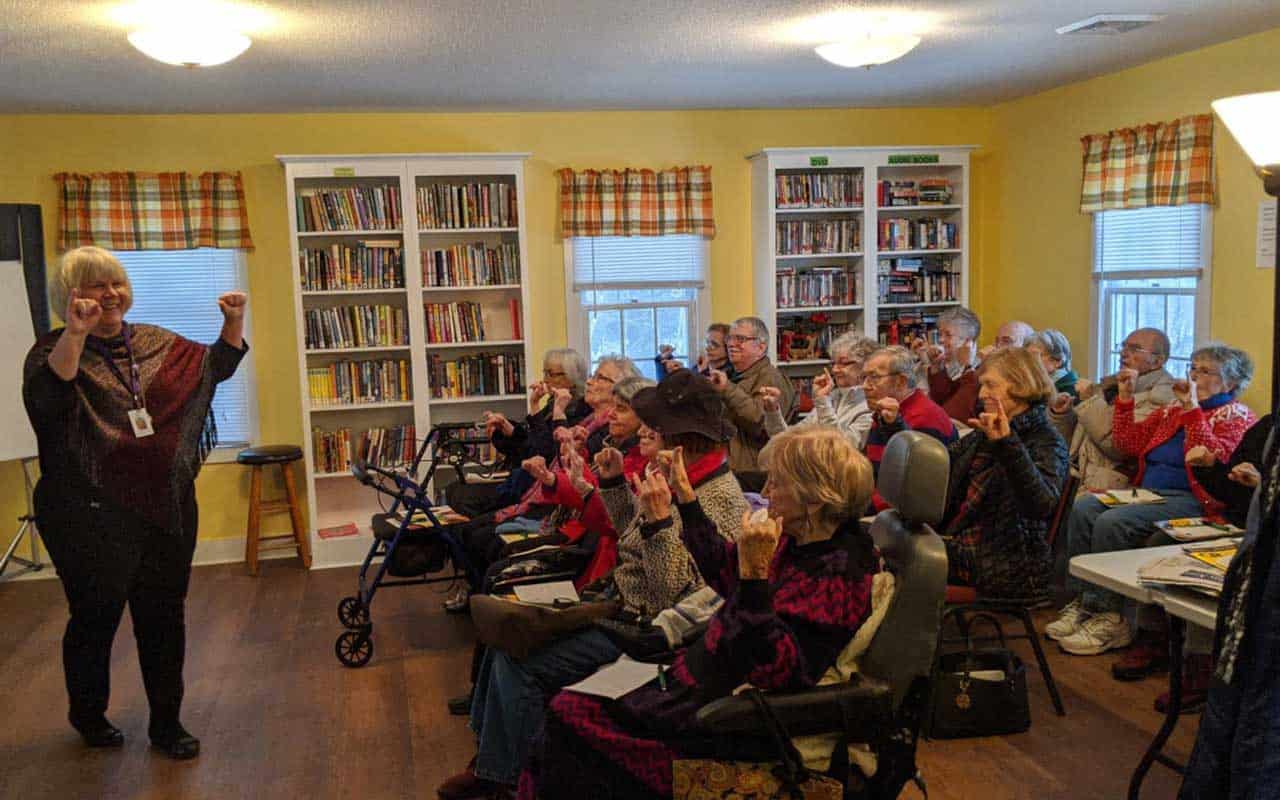As we move into the Holiday week and prepare our homes, kitchen, and ourselves for family, food, and some much earned vacation time, we sometimes allow things like dietary options and healthy eating habits drift merrily back into the recesses of merriment. To help temper our yuletide lust for all things festive and sweet, local healthcare leader Noble Horizons sent its expert members out into the community and welcomed some local professionals to discuss ways to live healthier during the holidays and beyond. As a professional- and a self-confessed vegetarian- Roufia Payman is keenly aware of how difficult it can be for most to avoid overindulging this time of year in our favorite holiday treats. Her encyclopedic knowledge of alternative meal options was on full display at Noble Horizons on Tuesday, December 10. Traveling from Nuvance’s Northern Dutchess Hospital in Rhinebeck, NY, where she works as a nutritionist, Mrs.Payman covered a variety of topics ranging from exercise and healthy activity, to of course, how to maintain healthy eating habits during the holidays. Mrs.Payman’s thirty-eight years as a nutritionist, more than twenty of which have been spent in outpatient nutrition counseling, she has successfully devised Ten Tips for Healthy Holiday Eating when we are tempted this year:
- Be realistic. Don’t try to lose pounds during the holidays, instead try to maintain your current weight.
- Plan time for exercise. Exercise helps relieve holiday stress and renew your energy level. Even moderate and daily increase in exercise can help partially offset increased holiday eating and burn up a few calories. Try 10 or 15 minute brisk walks twice a day.
- Don’t skip meals. Before leaving for a party, eat a light snack like raw vegetables or a piece of fruit to curb your appetite. You will be less tempted to over-indulge.
- Survey party buffets before filling your plate. Choose your favorite foods and skip your least favorite. Include fruits and vegetables to keep your plate balanced.
- Eat until you are satisfied, not stuffed. Savor your favorite holiday treats while eating small portions. Sit down, get comfortable, and enjoy.
- Be careful with beverages. Alcohol can lessen inhibitions and induce overeating; non-alcoholic beverages can be full calories and sugar.
- If you overeat at one meal go light on the next. It takes 500 calories per day (3,500 calories per week) above your normal/maintenance consumption to gain one pound. It is impossible to gain weight from one piece of pie!
- Take the focus off the food. Turn candy and cookie making time into non-edible projects like making wreaths, dough art decorations or a gingerbread house. Plan group activities with family and friends that aren’t all about food. Try serving a holiday meal to the community, playing games or going on a walking tour of decorated homes.
- Bring your own healthy dish to a holiday gathering.
- Practice Healthy Holiday Cooking. Preparing favorite dishes lower in fat and calories will help promote healthy holiday eating. Incorporate some healthy holiday tips in traditional holiday recipes.”
On Friday, December 6, one of the leaders in Noble Horizons’ memory care initiative stopped by the town of Northeast in New York to discuss to some proactive measures with concerned locals regarding lifestyle changes to cope with and prevent cognitive memory loss. Linda Orlowski, director of Whitridge at Noble Horizons, addressed several warning signs associated with memory loss to watch out for as well as a few misconceptions. Among those seemingly everyday moments of forgetfulness like repeating conversations and difficulty hearing were surprisingly revealed as red flags for the potential of long-term memory loss. However, traumatic moments of memory loss, like grief for example, have long been overstated as serious signs of early onset Alzheimer’s according to Mrs.Orlowski. Linda discussed a variety of preventative measures to sustain high levels of brain health chief among them keeping your brain active with constant physical and mental exercise. “When your body moves, so does your brain.” because family genetics plays a major role in the development of cognitive diseases, brain exercises like crossword puzzles, sudoku, and yoga play a vital role when it comes to prevention.

Mrs.Orlowski introduced the attendees to several key points of preventative interest including a comprehensive outline of the Four Pillars of Cognitive Loss Prevention. According to research these pillars include:
Diet– Diet remains one of the most important lifestyle changes recommended by health professionals. Linda unveiled both the top ten healthiest foods for the brain including beets, broccoli, salmon, and surprisingly, dark chocolate as well as the seven deadly sin foods to avoid. Among those foods to steer clear of are sugar i.e. soda and sweet juices, highly processed foods like frozen dinners, and of course alcohol (though the 1-2 glasses of wine per week for adults rule still applies).
Physical and Mental Exercise– Exercise in its many forms increases blood flow to the brain, an essential fact in the prevention of cognitive memory loss. Activities like reading, listening to music, artistic expression, and traditional aerobics keeps the blood in constant motion to the brain. The Chair Zumba class offered at Noble Horizons is a great example of a way physical activity can positively impact the mind.
Yoga/Meditation– According to Mrs.Orlowski, one of the best ways to reduce stress while keeping the brain active is through yogic meditation- namely Kirtan Krya. Over the last decade, research has shown that the simple 12 minute technique otherwise known as KK has significant brain boosting effects. KK has been proven as practical as it is effective, can be done at home, and is easy for seniors experiencing decreased mobility to practice.
Spiritual Well-Being– “Reflection is always a good thing to practice,” says Linda in regards to the inner health of one’s soul, “by keeping things like a Gratitude Journal, we can all remember what we are grateful for. For me, it’s my grandchildren.”
So what should you do when memory lapse interferes with your daily routine? Linda says first and foremost, “listen to your loved ones.” Take to heart the concerns of family and friends and whenever possible, talk to your primary physician. For Linda however, hope grows stronger with each new advancement, “To me cognitive loss is a disease that is treatable in the modern era of medicine, and prevention remains our greatest weapon.”
For more information on upcoming events, speakers, and seminars at Noble Horizons check out their website at noblehorizons.org
